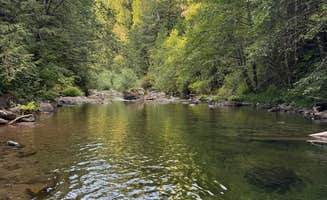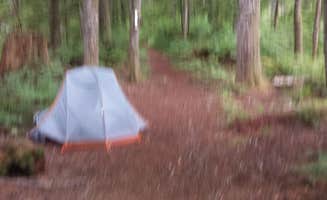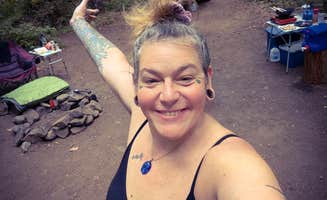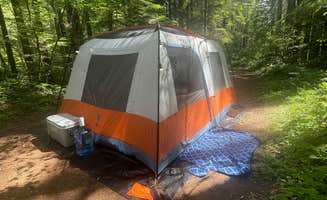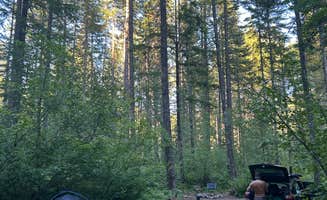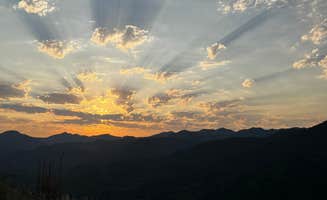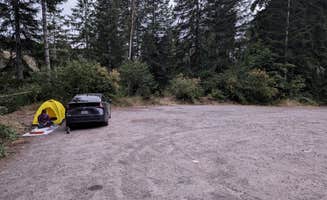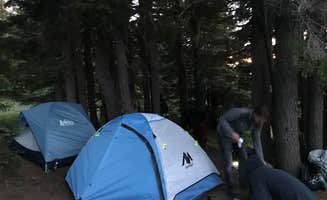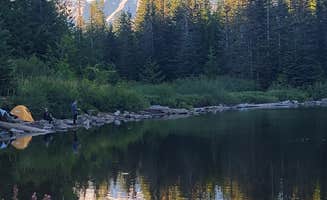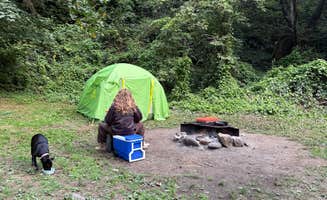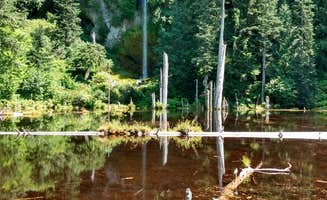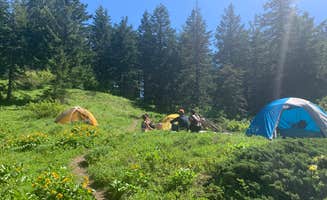Dispersed camping sites near Portland, Oregon provide free overnight stays in natural settings with limited facilities. Most locations require self-sufficiency with food, water, and waste management. Camping areas range from densely forested sites in Tillamook State Forest to more open spaces along creeks and rivers in Gifford Pinchot National Forest. Seasonal access varies, with many forest service roads becoming impassable during winter months.
What to do
Waterfall exploration: Beaver Falls Trailhead offers overnight parking with access to a scenic waterfall via a short hike. "The hike to the falls is to the far left of the pullout. Do NOT go down the super steep trails to the right. Beautiful waterfall after a short hike," advises Mike S. The pullout accommodates multiple vehicles and serves as a convenient base for waterfall viewing.
Mountain views: Mount St. Helens Dispersed Camping provides access to volcanic landscapes and hiking trails. A camper noted, "Complete view of the majestic mountain. Lots of room and even some flat spots. Idea for any rig, tent camper, hammock camper it vehicle. Road is rough in some spots but any vehicle can drive it." Sites are situated along Forest Service Road 83 with varying degrees of privacy.
Riverside relaxation: Creekside camping spots provide natural sound barriers from road noise. Many dispersed sites feature direct water access for cooling off during summer months. Water levels fluctuate seasonally, with spring months offering higher flows and summer providing more accessible wading areas.
What campers like
Privacy options: Little Soda Springs Rd Dispersed offers secluded sites with natural separation. "I decided to come back thinking I'd stay in the same spot as last time, but it was occupied. Thank goodness! Because I found THE most amazing spot!" reports Vanessa T. The area includes both drive-in and walk-in options for different camping preferences.
Digital disconnection: Most forest service areas have minimal or no cell coverage, creating opportunities for unplugged experiences. "Absolutely no cell service. You must have a Northwest Forest pass or America the beautiful pass," mentions a visitor to Little Soda Springs Rd. Downloading offline maps before arrival ensures navigation capability without service.
Wildlife observation: Panther Creek Creekside Camp provides natural habitats for diverse wildlife viewing. "Not too far from the nearest town but you will feel totally immersed out here. My carrier is Verizon, I didn't have any service whatsoever. Ice cold creek, towering trees," shares Alex R. Morning and evening hours typically offer the best wildlife viewing opportunities.
What you should know
Navigation challenges: Forest service roads often lack clear signage and may not appear on standard GPS systems. Downloading offline maps from the Forest Service website before departure provides essential backup navigation. Many campers report difficulty finding specific sites without proper preparation.
Seasonal restrictions: Fire bans commonly take effect from July through September depending on conditions. During high fire danger periods, even camp stoves may be prohibited in some areas. Always check current restrictions before departure.
Permit requirements: Tillamook State Forest Dispersed Camping and many other locations have specific permit needs. "There is a vault toilet closer to site 14 but no hookups. There is no real amenities or ATT/ Verizon service," notes a camper. Northwest Forest Passes cost $5 for day use or $30 annually and must be displayed in vehicles.
Tips for camping with families
Site selection: Choose locations with natural boundaries to contain young explorers. Creekside sites provide entertainment but require supervision. Areas with flat, open spaces offer room for activities while maintaining sight lines to children.
Noise considerations: Some areas experience recreational vehicle traffic. "Loved this spot. Gorgeous, lots of unique sites. Only downside is incredibly loud atv and dirt bike activity," shares a Tillamook Forest camper. Weekdays typically have less traffic and noise than weekends.
Safety preparations: Mirror Lake offers manageable hike-in options for families. "It's only ~3 mile hike in, so highly recommend anyone from beginner to expert backpacking to come checkout the campsites. Bring water filtrations or extra water since there is no water up there besides the lake," advises Sonja O. First aid supplies, extra water, and weather-appropriate clothing are essential for all family members.
Tips from RVers
Road condition assessment: Many forest service roads have rough sections requiring slow navigation. Avoid areas after heavy rainfall when mud can create hazardous conditions. Call ranger stations for current road status before attempting access with larger vehicles.
Size limitations: Canyon Creek Dispersed Camping presents challenges for larger rigs. "The site was great honestly, nice flat pads for tents, plenty of room for a trailer if you're brave enough to bring it down about 5 miles of rough rough gravel road," explains Melissa B. Most dispersed sites accommodate vehicles under 25 feet, with few options for larger RVs.
Resource management: Plan for complete self-sufficiency with water, waste disposal, and power. Most areas have no hookups or dumping facilities within 20 miles. Carrying extra water and ensuring proper waste containment prevents environmental damage and citation risks.


